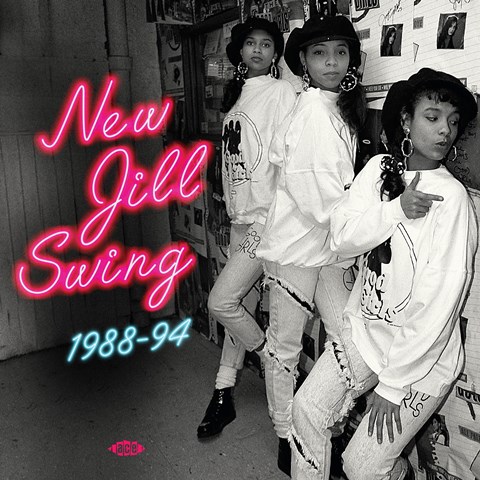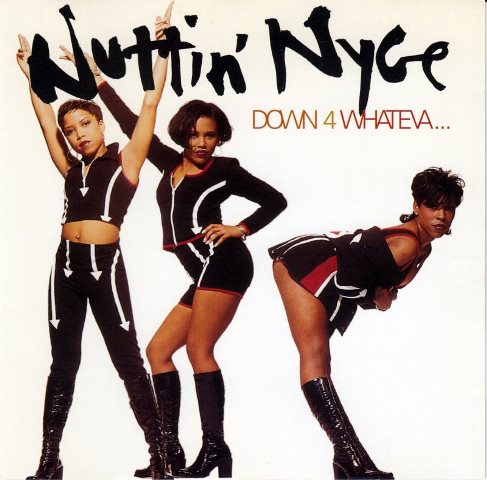As the name of a music genre, new jack swing was coined in an issue of the Village Voice dated 18 October 1987. Writer Barry Michael Cooper was profiling producer, songwriter and member of the R&B trio Guy, Teddy Riley when he created a tag exemplifying the mix of R&B and hip-hop which had hit super-big in 1986 with Janet Jackson’s Jimmy Jam and Terry Lewis-produced Control. Riley was on the same wavelength, and Cooper recognised a groundswell.
Swingbeat was interchangeable with new jack swing, but it was the latter which caught on. So When TLC and SWV emerged in 1992 they were swiftly tagged as trading in new jill swing, the female comeback to new jack swing. While the exact moment new jill swing became an identifier isn’t known – without deep research, that is – the intertwining of recognisably R&B vocals with tracks rooted in hip hop, merging the organic and electronic, was no longer an all-male preserve.
 As made clear by the new compilation New Jill Swing 1988-1994 this wasn’t a men-only terrain before 1992, even though concocting the collection’s titular genre took a while. Eighteen tracks are heard, mostly from singles with the odd album track. While En Vogue are the biggest name, Good Girls, Jade, Monie Love, Pebbles, Shanice and SWV aren’t far short. Ex-Girlfriend, Miki Howard, Joyce Irby, Nuttin’ Nyce, Tara Kemp, Chantay Savage, Karyn White and Xscape were strong hitmakers too. This collection isn’t about rescuing what has been lost. It is, though – surprisingly – the first overview of new jill swing.
As made clear by the new compilation New Jill Swing 1988-1994 this wasn’t a men-only terrain before 1992, even though concocting the collection’s titular genre took a while. Eighteen tracks are heard, mostly from singles with the odd album track. While En Vogue are the biggest name, Good Girls, Jade, Monie Love, Pebbles, Shanice and SWV aren’t far short. Ex-Girlfriend, Miki Howard, Joyce Irby, Nuttin’ Nyce, Tara Kemp, Chantay Savage, Karyn White and Xscape were strong hitmakers too. This collection isn’t about rescuing what has been lost. It is, though – surprisingly – the first overview of new jill swing.
Putting shape like this on a genre for the first time is always bold, especially as there can be restrictions in what can be licensed. It is a brave soul who steps-up to create such an opening-shot collection. Here, the compiler is author and Saint Etienne member Bob Stanley. Although each deals in a different music, New Jill Swing 1988-1994 is as intrepid as the recent In the Light of Time - UK Post-Rock and Leftfield Pop 1992-1998 compilation as both seek to assess relatively recent pop-cultural occurrences.
Writing in his introductory text for the set’s booklet, Stanley makes the point that “it’s been a recurring theme through pop history – the boys have a go first, their success inspires the girls, who then come along and do things their own way.” He goes on to say that in the Nineties, Take That and Boyzone were “followed by a decade of superior distaff acts like the Spice Girls, Sugarbabes and Girls Aloud.” For him, it seems, new jill swing is more satisfying than its male counterpart. Indeed, Stanley asserts that new jack swing “set the tone for some of the most exciting music of the 90s, a golden age for female R&B.”
 In this spirit, there is no filler. Take the stop-you-in-your-tracks “Your Sweetness” by The Good Girls (not from a single, but the version on 1989’s Motown album All For Your Love). The hard Linn Drum-like rhythms are counterpointed with a jittery, Supremes-ish ensemble vocal nodding back to classic soul of an earlier era. Or take Pebbles’ “Giving You the Benefit” (1990, the single version). It sounds awfully like it became part of The Spice Girls sonic template. Then there’s Nuttin’ Nyce’s remarkable “In my Nature” (from 1993’s Down 4 Whateva LP) which, melodically, predicts TLC’s “Waterfalls,” issued the next year. It also, again, points to aspects of The Spice Girls. Temporally reversing this, Joyce Irby’s vocal on “She’s Not my Lover”(1989, from the Motown LP Maximum Thrust) has an overt shades of Michael Jackson.
In this spirit, there is no filler. Take the stop-you-in-your-tracks “Your Sweetness” by The Good Girls (not from a single, but the version on 1989’s Motown album All For Your Love). The hard Linn Drum-like rhythms are counterpointed with a jittery, Supremes-ish ensemble vocal nodding back to classic soul of an earlier era. Or take Pebbles’ “Giving You the Benefit” (1990, the single version). It sounds awfully like it became part of The Spice Girls sonic template. Then there’s Nuttin’ Nyce’s remarkable “In my Nature” (from 1993’s Down 4 Whateva LP) which, melodically, predicts TLC’s “Waterfalls,” issued the next year. It also, again, points to aspects of The Spice Girls. Temporally reversing this, Joyce Irby’s vocal on “She’s Not my Lover”(1989, from the Motown LP Maximum Thrust) has an overt shades of Michael Jackson.
What’s on New Jill Swing obviously doesn’t exist in a vacuum, which raises the role call of male names profusely littering the set’s writing and production credits. Amongst these, Pebbles gets a co-producer/executive producer namecheck for “Giving You the Benefit.” Monie Love is co-producer of “Full Term Love.” Former George Clinton associate and Klymaxx member Joyce Irby co-writes and produces (under her Fenderella guise) her own “She’s Not my Lover.” Chantay Savage co-writes her own “Betcha’ll Never Find”. That’s it for the female credits: two co-productions, one production, two co-writes. Of the 18 tracks, a total of four – beyond fronting the record and singing – have a female contribution.
This doesn’t undermine the ground-breaking New Jill Swing 1988-1994. It is a terrific, hugely enjoyable and diligent collection. Important too. Equally, however, it cannot be anything other than thought provoking, as an assiduous compilation should be.
- Next week: "Cycle Annie," "The Ostrich," surf music cash-ins and more. Why Don’t You Smile Now - Lou Reed At Pickwick Records 1964-65
- More reissue reviews on theartsdesk
- Kieron Tyler’s website















Add comment